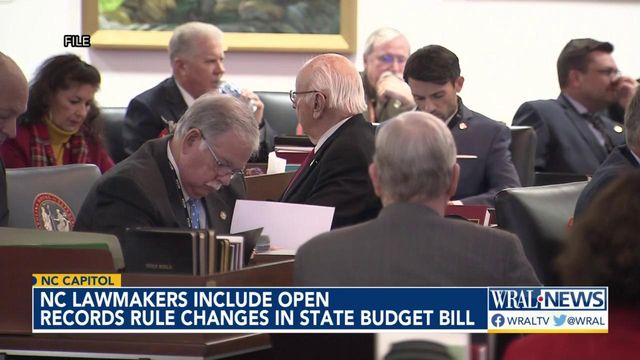Provision in NC budget could shield lawmaker records from public
Language in a budget draft would let lawmakers decide whether to release their records to the public. It is "the deepest cut to the public records act since it was enacted," one lawyer says.
Posted — UpdatedA paragraph in the new state budget that North Carolina lawmakers plan to finalize this week would empower state legislators to decide which records in their offices are public and which ones they keep private.
The language is direct: "A legislator, while in office or after leaving office, shall not be required to reveal or to consent to reveal any document, supporting document, drafting request, or information request made or received by that legislator while a legislator."
This language codifies what some lawmakers already practice, Fuller said, but this will explicitly allow them to refuse open records act requests that other government officials have to comply with.
Speaker of the House Tim Moore, R-Cleveland, said lawmakers wanted to clarify what has been an unclear section of state law. "Important to clear up any ambiguity," he said.
The bill also erases an existing state law that makes communications created during back-and-forth of the legislative redistricting process public once the process has wrapped up. Those communications are private while lawmakers are drawing new election maps, but current state law specifically says the back-and-forth becomes part of the public record once the new maps become law.
Language in the new budget simply deletes that section of state code.
All these changes would take effect immediately once the budget becomes law. State lawmakers plan to approve the budget in votes Thursday and Friday. After that Gov. Roy Cooper has 10 days to sign the bill into law or veto it, which would send it back to the legislature for more votes.
The bill is widely expected to become law. These open records changes are mixed in with $30 billion in annual state spending and a trigger allowing the state to implement Medicaid expansion, a multi-billion-dollar expansion of a state health insurance program expected to help hundreds of thousands of people.
Once the open records changes pass along with the budget, "we are totally in the dark if [lawmakers] choose to keep us that way," Fuller said.
Capitol Broadcasting Co., the owner of WRAL News, is a member of the NCAB.
"Taken together, the provisions would allow any state lawmaker to make the determination whether his or her office’s own records are public or not — and then to decide what to do with the records, including destroy or sell them," the association said.
Democratic Gov. Roy Cooper said Thursday he opposes the language, too.
"It's wrong for North Carolina," he said. "There should be much more transparency."
Related Topics
• Credits
Copyright 2024 by Capitol Broadcasting Company. All rights reserved. This material may not be published, broadcast, rewritten or redistributed.






